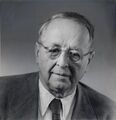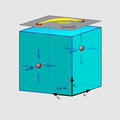Template:Selected anniversaries/November 9: Difference between revisions
No edit summary |
No edit summary |
||
| Line 34: | Line 34: | ||
||2012 – Sergey Nikolsky, Russian mathematician and academic (b. 1905) | ||2012 – Sergey Nikolsky, Russian mathematician and academic (b. 1905) | ||
||Émile Zuckerkandl (d. November 9, 2013) was an Austrian-born French biologist considered one of the founders of the field of molecular evolution. He is best known for introducing, with Linus Pauling, the concept of the "molecular clock", which enabled the neutral theory of molecular evolution. | |||
File:Weyl semimetal diagram.png|link=Weyl semimetal (nonfiction)|2017: First use of [[Weyl semimetal (nonfiction)|Weyl semimetal crystals]] as a quantum [[Time machine (nonfiction)|time machine]] which detects and prevents [[crimes against mathematical constants]]. | File:Weyl semimetal diagram.png|link=Weyl semimetal (nonfiction)|2017: First use of [[Weyl semimetal (nonfiction)|Weyl semimetal crystals]] as a quantum [[Time machine (nonfiction)|time machine]] which detects and prevents [[crimes against mathematical constants]]. | ||
Revision as of 10:43, 29 November 2017
1885: Mathematician, physicist, and philosopher Hermann Weyl born. He will be one of the most influential mathematicians of the twentieth century: his research will have major significance for theoretical physics as well as purely mathematical disciplines including number theory.
1922: Mathematician, philosopher, and academic Imre Lakatos born. He will be known for his thesis of the fallibility of mathematics and its 'methodology of proofs and refutations' in its pre-axiomatic stages of development.
2005: The Venus Express mission of the European Space Agency is launched from the Baikonur Cosmodrome in Kazakhstan.
2017: First use of Weyl semimetal crystals as a quantum time machine which detects and prevents crimes against mathematical constants.



